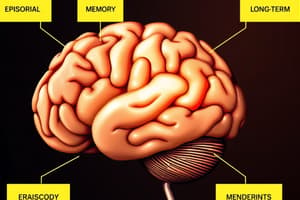Podcast
Questions and Answers
Which of the following best describes the capacity of long-term memory according to the Modal Model of Memory?
Which of the following best describes the capacity of long-term memory according to the Modal Model of Memory?
- Constrained by the duration of short-term memory
- Limited to approximately 7 items
- Dependent on attention and rehearsal
- Relatively unlimited (correct)
In the context of the serial position curve, what strategy is MOST effective for improving recall of items at the beginning of a list?
In the context of the serial position curve, what strategy is MOST effective for improving recall of items at the beginning of a list?
- Focusing on the emotional content of items at the end of the list.
- Presenting items more quickly to reduce the primacy effect.
- Using articulatory suppression to prevent rehearsal.
- Minimizing interference during encoding through rehearsal. (correct)
In the Dewey Rundus (1971) experiment, what was the primary effect of articulatory suppression (saying each word out loud but not memorizing) on memory recall?
In the Dewey Rundus (1971) experiment, what was the primary effect of articulatory suppression (saying each word out loud but not memorizing) on memory recall?
- It diminished recall of items at the end of the list.
- It reduced the number of rehearsals, particularly for items at the start of the list, and consequently the primacy effect. (correct)
- It enhanced recall of items at the beginning of the list.
- It had no effect on the serial position curve.
Glanzer and Cunitz (1966) demonstrated the recency effect by having participants recall items immediately or after a delay. What conclusion did they derive about the nature of the recency effect from this experiment?
Glanzer and Cunitz (1966) demonstrated the recency effect by having participants recall items immediately or after a delay. What conclusion did they derive about the nature of the recency effect from this experiment?
What is the MOST significant impact of damage to the hippocampus, as observed in patient H.M.?
What is the MOST significant impact of damage to the hippocampus, as observed in patient H.M.?
Which type of memory was MOST affected by H.M.'s surgery?
Which type of memory was MOST affected by H.M.'s surgery?
What is the key difference between retrograde and anterograde amnesia?
What is the key difference between retrograde and anterograde amnesia?
What is the primary distinction between explicit (declarative) and implicit (non-declarative) memory?
What is the primary distinction between explicit (declarative) and implicit (non-declarative) memory?
A patient with damage to their medial temporal lobe, hippocampus, and seizures can recall general knowledge and facts but cannot remember personally experienced events. Which type of memory is MOST likely impaired?
A patient with damage to their medial temporal lobe, hippocampus, and seizures can recall general knowledge and facts but cannot remember personally experienced events. Which type of memory is MOST likely impaired?
What is the core difference between semantic and episodic memory?
What is the core difference between semantic and episodic memory?
What is semanticization, as described by Petrican et al. in the context of long-term memory?
What is semanticization, as described by Petrican et al. in the context of long-term memory?
Priming makes pizza smell that you don't pay attention to trigger you when hungry later. What type of implicit memory is involved in this phenomenon?
Priming makes pizza smell that you don't pay attention to trigger you when hungry later. What type of implicit memory is involved in this phenomenon?
In the Peter Graf et al (1985) study, individuals with amnesia and normal brains were asked to rate words for liking without being told to memorize them. Which of the following BEST describes the key finding?
In the Peter Graf et al (1985) study, individuals with amnesia and normal brains were asked to rate words for liking without being told to memorize them. Which of the following BEST describes the key finding?
What does the "word stem task" primarily assess in memory research?
What does the "word stem task" primarily assess in memory research?
What is the PRIMARY focus of Karl Lashley's research on memory?
What is the PRIMARY focus of Karl Lashley's research on memory?
What does 'consolidation' refer to in the context of long-term memory formation?
What does 'consolidation' refer to in the context of long-term memory formation?
According to Donald Hebb's concept, 'Neurons that fire together, wire together,' refers to what biological process?
According to Donald Hebb's concept, 'Neurons that fire together, wire together,' refers to what biological process?
What is the key difference between Long-Term Potentiation (LTP) and Long-Term Depression (LTD)?
What is the key difference between Long-Term Potentiation (LTP) and Long-Term Depression (LTD)?
How does the hippocampus contribute to memory processing?
How does the hippocampus contribute to memory processing?
What does the synaptic theory of memory propose?
What does the synaptic theory of memory propose?
What role does attention play in encoding memories?
What role does attention play in encoding memories?
Which of the following is the BEST example of using mnemonics to enhance memory encoding?
Which of the following is the BEST example of using mnemonics to enhance memory encoding?
According to the levels of processing theory, which encoding strategy would MOST likely lead to better memory retention?
According to the levels of processing theory, which encoding strategy would MOST likely lead to better memory retention?
Which type of encoding is most likely to improve memory, according to the levels of processing theory?
Which type of encoding is most likely to improve memory, according to the levels of processing theory?
According to TB Rogers et al (1977), which type of encoding leads to improved recall?
According to TB Rogers et al (1977), which type of encoding leads to improved recall?
According to the levels of processing theory, which type of processing enhances encoding because it ensures survival?
According to the levels of processing theory, which type of processing enhances encoding because it ensures survival?
What is the primary difference between recall and recognition as retrieval processes?
What is the primary difference between recall and recognition as retrieval processes?
Retrieval cues can help recollection. Which of the following BEST exemplifies retrieval cue?
Retrieval cues can help recollection. Which of the following BEST exemplifies retrieval cue?
What is context dependent memory?
What is context dependent memory?
Which statement accurately summarizes context-dependent memory's effect on recall?
Which statement accurately summarizes context-dependent memory's effect on recall?
According to Goodwin et al, what is state-dependent memory?
According to Goodwin et al, what is state-dependent memory?
According to Eich and Metcalfe, which of the following is an example of Mood Dependent Memory?
According to Eich and Metcalfe, which of the following is an example of Mood Dependent Memory?
What is the MOST critical factor in mood-dependent memory?
What is the MOST critical factor in mood-dependent memory?
Which of the following statements BEST describes the concept of 'encoding specificity'?
Which of the following statements BEST describes the concept of 'encoding specificity'?
What does the research on context-dependent memory suggest about studying for exams?
What does the research on context-dependent memory suggest about studying for exams?
If you learned something while drunk and then try to recall that something, what will MOST likely benefit recall?
If you learned something while drunk and then try to recall that something, what will MOST likely benefit recall?
Which of the following situations BEST demonstrates the principle of state-dependent memory?
Which of the following situations BEST demonstrates the principle of state-dependent memory?
Flashcards
Explicit (declarative) memory
Explicit (declarative) memory
Consciously recalled memories you are aware of externally or internally.
Implicit (non-declarative) memory
Implicit (non-declarative) memory
Skills and actions that are not completely consciously recalled
Episodic memory
Episodic memory
Experienced events throughout life; mental time travel to remember an event.
Semantic memory
Semantic memory
Signup and view all the flashcards
Procedural memory
Procedural memory
Signup and view all the flashcards
Priming
Priming
Signup and view all the flashcards
Primacy effect
Primacy effect
Signup and view all the flashcards
Recency effect
Recency effect
Signup and view all the flashcards
Anterograde amnesia
Anterograde amnesia
Signup and view all the flashcards
Retrograde amnesia
Retrograde amnesia
Signup and view all the flashcards
Semanticization
Semanticization
Signup and view all the flashcards
Engram
Engram
Signup and view all the flashcards
Consolidation
Consolidation
Signup and view all the flashcards
Long-term potentiation (LTP)
Long-term potentiation (LTP)
Signup and view all the flashcards
Long-term depression (LTD)
Long-term depression (LTD)
Signup and view all the flashcards
PEMDAS
PEMDAS
Signup and view all the flashcards
Context-dependent memory
Context-dependent memory
Signup and view all the flashcards
State-dependent memory
State-dependent memory
Signup and view all the flashcards
Levels of processing
Levels of processing
Signup and view all the flashcards
Study Notes
Long Term Memory Structure and Processes
- Atkinson and Shiffrin proposed the Modal Model of Memory in 1968.
- Long-term memory (LTM) is for relatively permanent storage of information over long periods.
- LTM has a relatively permanent duration and a relatively unlimited capacity.
- LTM is acquired across a lifespan.
Types of Long Term Memory
- Explicit (Declarative) Memory is consciously recalled, with awareness internally or externally.
- Episodic memory involves experienced events throughout life that can be relived through mental time travel, such as remembering a party.
- Semantic memory includes knowledge, concepts, and facts about the world.
- Implicit (Non-Declarative) Memory operates without complete awareness.
- Procedural memory involves skills and actions.
- Priming is a type of implicit memory.
Serial Position Curve
- The Serial Position Curve, studied by Murdoch Jr. in 1962, illustrates how the position of words in a list affects recall accuracy.
- The primacy effect is remembering items at the beginning of a list because they are rehearsed more and experience less interference.
- The recency effect is remembering items at the end of a list best, better than items in the middle or beginning.
Primacy Effect
- Dewey Rundus (1971) researched the primacy effect.
- Presenting words separated by 5-second intervals and using articulatory suppression to prevent memorization was studied.
- Preventing rehearsal leads to problems in remembering items at the beginning of a list.
- The number of rehearsals tends to be higher at the beginning of the list and decreases toward the end.
Recency Effect
- Glanzer and Cunitz (1966) investigated whether the recency effect relates to short-term memory, if STM plays a role then study waiting some time before you start writing those elements.
- In a study, one group immediately recalled items, while another group counted backwards for 30 seconds before recall.
- Participants recalled rehearsed items better but struggled with items at the end of the list after the delay.
- Long-term memory relies on rehearsal, transferring information from short-term to long-term memory.
- The recency effect only involves information recently learned if it doesn't pass into Long Term memory.
The Hippocampus
- Hippocampus: Latin for seahorse, with two in each hemisphere.
- The hippocampus formation is implicated in memory formation.
Patient HM
- Patient HM, studied by Brenda Miller, suffered from seizures that originated in the medial temporal lobes, including the hippocampus.
- Surgical removal of these areas stopped his ability to form new long term memories.
- Amnesia refers to the loss or disorder of memory.
- Anterograde amnesia is the inability to form new memories.
- Retrograde amnesia is the inability to access old memories.
Declarative vs Non-Declarative Memory
- HM lost explicit memories for events or knowledge after surgery and could not encode them.
- HM retained good implicit new memories but wouldn't remember meeting Brenda Milner
Semantic and Episodic Memory
- Endel Tulving researched semantic and episodic memory.
- Patient KC suffered damage to the medial temporal lobe and hippocampus due to a bike accident.
- KC lost episodic memory, experiencing both retrograde and anterograde amnesia for past events, but retained semantic memory.
- Semantic and episodic memory are distinct but used together, with semantic knowledge influencing how episodic memories are encoded.
- Petrican et al. studied the interaction between semantic and episodic memory in older adults using newspaper articles of past events.
- The study calls the shift from episodic to semantic memory semanticization.
Implicit Memory
- Implicit memory involves non-conscious remembering.
- Procedural memory is related to skills and actions.
- Priming occurs when exposure to a stimulus affects future behavior without conscious memory of the stimulus; for instance, smelling pizza may cause a craving later without remembering the smell itself.
- Peter Graf et al. (1985) found that individuals with amnesia and those with normal brains could rate lists of words without being told to remember them.
Memory Recall
- Word stem tasks, involving exposure to words, were completed using existing knowledge.
- Explicit recall tasks ask where certain words were presented.
Biological Basis of Memory
- Karl Lashley (1930s) studied the biological basis of memory.
- Rats were trained to run mazes.
- Systematic lesioning of different brain areas shows where memories might be stored.
- Engrams are not stored in a single place.
- Engrams are the physical basis of memory involving the structure and interaction of neurons and synapses distributed across the brain.
- Consolidation is how engrams become imprinted into the nervous system.
- Consolidation affixes or connects engrams to long-term memory.
- This process stabilizes memory traces and happens at the synaptic level.
- At the systems level, memory involves networks of neurons and connections.
- Memory is stored between connections of neurons
Donald Hebb
- Donald Hebb (Lashley's student) proposed, "Neurons that fire together wire together." Two neurons firing action potential at the same time will form stronger connections.
- Long-term potentiation (LTP) strengthens connections, increasing neurotransmitters and vesicles.
- Long-term depression (LTD) weakens connections.
Memory Storage
- Memories are stored across the entire brain.
- The hippocampus serves as a "memory index" in the temporal lobe, initiating or locating memories and projecting them to the cortex.
- Synaptic theory of memory suggests that memories are relative weights or connection strengths, between neurons.
- In the hippocampus, LTP and LTD create networks of neurons with strong synapses but weak connections without light signals.
- Over time, the cortex forms connections with other neurons connected with the hippocampus neurons; allowing its own networks.
Encoding Things into Memory
- Successful encoding depends on attention.
- Mnemonic devices are learning aids or strategies that enhance recall like PEMDAS, ABCs, and ROYGBIV.
Levels of Processing
- Shallow processing (superficial) leads to less memorable information.
- Deep processing (meaningful) enhances memorability, studied by Craik and Tulving (1975).
- Self-reference effect, researched by TB Rogers et al. (1977), show that information that is meaningful and self-relevant improves memorability
Factors for Remembering
- Survival is one of the most important factors in remembering things, if they help you survive
- Visual imagery means you are more likely to remember things if you picture them in mind
- Practice tests make it more likely to remember if you have been tested on it
Memory Retrieval
- Retrieval reactivates or reconstructs memories from storage.
- Recall involves generating remembered information independently.
- Recognition involves identification of selecting previously remembered information from several options.
- Retrieval cues are hints that facilitate recall.
- Cued recall is better than free recall
Encoding and Retrieval
- Context-dependent memory (Godden and Baddeley) demonstrates better recall when the physical or external context during encoding and retrieval is similar.
- State-dependent memory (Goodwin et al.) shows memory is best when internal/mental state context matches during encoding and retrieval.
- Mood-dependent memory (Eich and Metcalfe) is best when mood matches between encoding and retrieval.
Studying That Suits You
Use AI to generate personalized quizzes and flashcards to suit your learning preferences.




